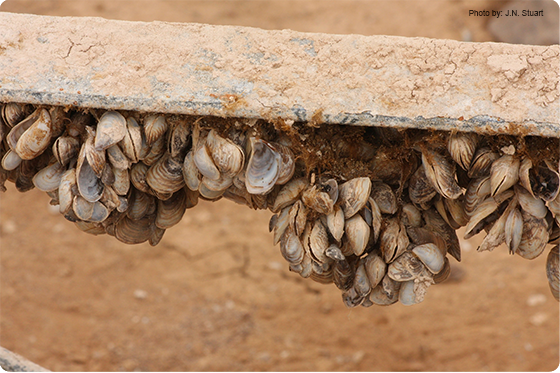
On November 14, the United States Senate passed the “Frank LoBiondo Coast Guard Authorization Act of 2018” by almost unanimous vote. The bill will now move to the House of Representatives for reconciliation, where it is expected to pass. In addition to a compromise deal outlining a new regulatory approach to ballast water discharges and a variety of other provisions, the bill includes language adding quagga mussels as an injurious species under Title 18 of the Lacey Act (18 U.S.C. 42). The relevant provision reads:
(e) QUAGGA MUSSEL.—Section 42(a)(1) of title 18, United States Code, is amended, in the first sentence, by inserting ‘‘of the quagga mussel of the species Dreissena rostriformis or Dreissena bugensis;’’ after ‘‘Dreissena polymorpha;’’.
Title 18 prohibits the importation into the United States of species “deemed to be injurious or potentially injurious to the health and welfare of human beings, to the interest of forestry, agriculture, and horticulture, and to the welfare and survival of the wildlife or wildlife resources of the United States. In addition to importation, Title 18 prohibits “any shipment between the continental United States, the District of Columbia, Hawaii, the Commonwealth of Puerto Rico, or any possession of the United States.” A longstanding U.S. Fish and Wildlife Service interpretation of the shipment clause asserted that it also prohibited the shipment of injurious species across state lines.
Western states and other organizations concerned about the spread of quagga mussels from the Great Lakes have been advocating for an injurious species listing for some time. The quagga mussel’s close cousin – the zebra mussel – was listed by Congress in 1990. Advocates believed that a listing would serve as a powerful tool for deterrence since the federal government could prosecute people who transported quagga mussels across state lines – attached to the hull of a trailered boat, for instance.
A recent federal court decision, however, struck down the Fish and Wildlife Service’s interpretation that Title 18 prohibited interstate transport. On April 7, 2017, the D.C. Circuit Court of Appeals issued its opinion in United States Association of Reptile Keepers v. Zinke. The court held that Title 18 prohibits only the importation of listed injurious species into the United States and shipments of injurious species between the continental United States and listed territories. This ruling means that it is not a violation of federal law to move injurious species across state lines. The ruling significantly restricts the Fish and Wildlife Service’s ability to address environmental risks from interstate transport of invasive species.
An injurious species listing, however, is not rendered meaningless by the USARK ruling. If the bill is signed into law, two activities currently allowed under federal law would be prohibited. First, the listing would make it illegal to import quagga mussels into the United States without a permit issued by the Fish and Wildlife Service. The Fish and Wildlife Service’s definition of “import” is very broad. According to 50 C.F.R. § 10.12, “import means to land on, bring into, or introduce into, or attempt to land on, bring into, or introduce into any place subject to the jurisdiction of the United States, whether or not such landing, bringing, or introduction constitutes an importation within the meaning of the tariff laws of the United States.” Driving a boat from Canada to Alaska with quagga mussels attached would arguably be bringing quagga mussels into the United States and therefore an import that is prohibited by Title 18.
Second, the listing would prohibit the shipment of quagga mussels between the continental United States and “the District of Columbia, Hawaii, the Commonwealth of Puerto Rico, or any possession of the United States.” The Fish and Wildlife does not have a regulatory definition of shipment, but its common meaning is transportation of cargo by mail or another commercial carrier. Black’s Law Dictionary, for example, defines “shipment” as “1. The transportation of goods by sea, road, or air; esp., the delivery of goods to a carrier and subsequent issuance of a bill of lading. 2. A load of goods so shipped; an order of goods.” If a person were to arrange for the transport of jet skis from Arizona to Hawaii, and those jet skis had quagga mussels on board, that would be a shipment of an injurious species under Title 18.
It is important to note that criminal prosecutions under Title 18 are not common, and often focus on commercial operators with repeat offenses or large volumes. Federal agencies, however, have a range of other tools available to encourage compliance including education and outreach activities, monitoring and inspection authority, and civil fines and other penalties. The Fish and Wildlife, for instance, might develop training programs for border inspectors or work with states to increase outreach to boaters.
The Lacey Act is split between two federal statutes. A second provision, Title 16 (16 U.S.C. § 3372), covers the wildlife trafficking provisions of the Lacey Act. Title 16 makes it unlawful to import, export, transport, sell, receive, acquire, or purchase in interstate or foreign commerce any fish, or wildlife taken, possessed, transported, or sold in violation of any law or regulation of any state. The USARK ruling had no impact on Title 16, but it does reinforce the importance of strong state laws in the fight against invasive species. Most western states prohibit the possession and transport of quagga mussels. Interstate movement of quagga mussels in violation of state law could be a violation of Title 16 that could be subject to federal prosecution.












